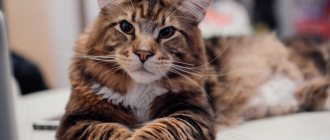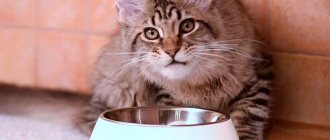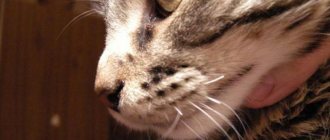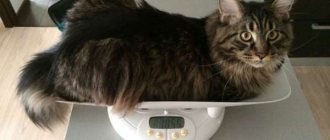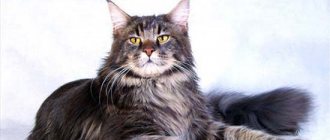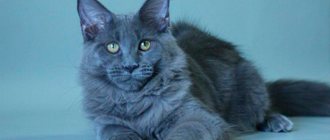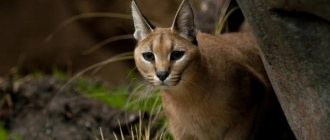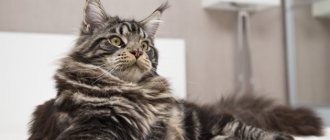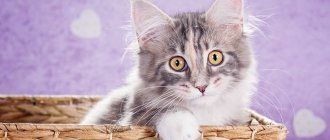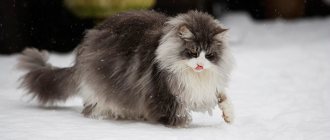The average lifespan of domestic cats is about 15-17 years. The key factors are the living conditions of the animal, the characteristics of the breed, proper care by the owner, and regular visits to the veterinarian.
There are also long-lived cats, living about 20-23 years; their record is often associated with high-quality care and an active lifestyle of the animal itself. How long do Maine Coons live at home?
There is a stereotype that purebred cats are more susceptible to diseases, need mild conditions and do not live long. Actually this is not true.
Representatives of the Maine Coon breed (North American semi-longhair cat) have proven that they are very resilient cats, but require careful care.
With proper care, the lifespan of Maine Coons is more than 12 years; despite their large size, North American semi-longhair cats have good health and are distinguished by their endurance.
According to veterinary clinics and insurance centers, about 50% of North American semi-longhair cats around the world live to the age of 16-17 years.
The rule that the larger the pet, the shorter it lives, applies only to dogs, not cats. The reason lies in the fact that the difference in size between a Maine Coon and an ordinary cat is not as great as between a shepherd dog and a Spitz. Therefore, you should not be afraid to get a large breed cat.
Cats
If you become the owner of a representative of a beautiful breed, then you are probably interested in the question: how long do Maine Coons live as cats at home? We can reassure all owners that with good care and love for their pet, the life of the pet will be long.
On average, Maine Coon cats live about 15-16 years. It is worth noting that females live 1-2 years longer than males. This fact is explained by the characteristics of the breed and natural immunity, which is higher in cats, because they are the ones who have to bear and feed the offspring.
Maine Coons are long-lived
In the United States, a record for life expectancy among Maine Coons was officially registered. The cat Koderoy was born in 1989 and managed to live about twice as long as the representatives of his breed. Success lay in proper nutrition and an active lifestyle, because the cat was by no means a homebody, he spent a lot of time outdoors and hunting. Factors influencing the average lifespan of Maine Coons
To ensure that your North American Longhair cat lives a long life, pay attention to the following factors:
- the pet’s health status (based on the characteristics of the breed, hereditary factors);
- the quality of the conditions in which the cat is kept (the presence of its own space, the absence of dangerous objects and substances in the public domain);
- proper care, including systematic visits to the veterinary clinic and preventive examinations.
How many years do cats of different breeds live?
This issue often causes controversy. Veterinarians believe that the lifespan of a domestic cat depends more on existing diseases and care, and not on its breed. Breeders do not agree with them, noticing that representatives of different breeds have different life expectancies.
First, let's compare purebred and simple cats. Genetically healthy, purebred parents give birth to purebred kittens. Naturally, their chances of living a long, happy life in a family are much greater than their wandering brothers.
Cats, which owe their birth to selective breeding, have relatively poor health. The structure of their body was artificially changed by geneticists. Other breeds are indigenous, they appeared naturally, adapting to environmental conditions. If we compare “designer” and “natural” purebred cats, the latter live longer. Selected breeds are prone to genetic diseases and require special care.
Let's look at the average life expectancy of popular breeds.
British
British cats have developed muscles, strong immunity and lead an active lifestyle. Representatives of this breed live 12-15 years, and some live up to 20, of course, with proper care. Genetic diseases are rarely observed in British cats. The risk of cancer is low.
British shorthair cat
Scottish fold cats
Teddy bear cubs are real long-livers! They have enviable immunity and can live up to 20 years. Examine your pet regularly, as its weak points are the ears and spine.
Scottish fold cat
Siamese
Siamese cats live 14-18 years. However, this breed has incredible endurance, and among them there are long-livers, living up to 30 years of age. The predisposition to a long life can be passed on from generation to generation, so before choosing a kitten, check with the breeder about its pedigree.
Siamese cat
Abyssinian cats
With proper care, Abyssins live about 15 years, some cats live up to 20. Representatives of this breed have a predisposition to diseases of the kidneys, retina, blood and teeth.
Abyssinian cat
Persians
Each variety of the Persian breed has its own life expectancy indicator. Cats with short noses live longer than their extreme and classic counterparts - 20 years versus 15
It is important to pay special attention to cats that have crossed the 10-year mark. At this time, the Persian's immunity weakens, and problems with joints, spine and kidneys may occur. You need to regularly visit the veterinarian, carefully pick up the cat in your arms, and take breaks from playing.
Some Persians find it difficult to bend down; they should place the bowl on a slight elevation
You need to regularly visit the veterinarian, carefully pick up the cat in your arms, and take breaks from playing. Some Persians find it difficult to bend down; they should place the bowl on a slight elevation.
Persian cat
Russian blue cats
When properly kept at home, Russian Blue cats live an average of 15 years. It is possible to extend the life of cats as much as possible up to 18-19 years. Starting from the age of 8, the owner must take his pet to the veterinarian annually.
Russian blue cat
Bengals
Bengal cats live long lives due to their lack of cardiovascular disease. The average life expectancy is 15-16 years. Graceful Bengals are one of the strongest and hardiest breeds.
Bengal cat
Sphinxes
The average lifespan of a Sphynx is 10 years, but hairless cats can please their owners for 20 years. There is even a known case when a sphinx lived for 31 years. Pets of this breed can boast of excellent immunity even in advanced years.
Canadian Sphynx
Other breeds
The real long-livers, reaching 20 years, are the Thai breed, the American Shorthair and the Manx. The average life span of the Asian tabby and Egyptian Mau is one year less. Devon Rex, Japanese Bobtail and Tiffany reach adulthood. The Australian Smoky, Neva Masquerade and Maine Coon live a little less - 17 years. 15-16 years is the limit for the Arabian Mau, Asian Shorthair and Selkirk Rex. Exotic cats, Yorkie chocolate cats, and American bobtails live up to 14 or 13 years of age. The Bombay cat and Snowshoe can delight their owners for 12 years.
Main causes of premature death
Representatives of the breed are susceptible to the following diseases:
- hypertrophic cardiomyopathy (a hereditary disease that occurs due to gene mutations that affects the contraction of the heart muscles);
- hip dysplasia (can make a young cat disabled and have great difficulty walking);
- back muscle atrophy;
- polycystic kidney disease (presence of cysts from birth that grow and lead to kidney failure).
Death at an early age is possible only from hereditary diseases, so it is extremely important to find a responsible breeder who strictly selects animals for breeding!
Disease Prevention
Many diseases that occur in Maine Coons can be avoided if a number of measures are taken in advance:
- a balanced diet, including premium food, fresh meat, vitamins, minerals, and sufficient water;
- compliance with the vaccination schedule for cats, systematic antiparasitic treatment for preventive purposes;
- spacious living space, maintaining an active lifestyle;
- reduction of stressful situations, for Maine Coons this means a change of housing, owner;
- hygienic care of animals;
- systematic observation by a veterinarian.
How to extend the life of a pet
Many people are interested in how long Maine Coons live at home and how to increase its duration. Proper nutrition, good care, proper maintenance, and compliance with safety rules play an important role. Animals have genetic diseases that are unique to this breed (diseases of the cardiovascular system, joint pathologies); timely prevention and therapy will help to avoid serious health problems.
Compliance with the following rules will help ensure a long life for your pet:
- Vaccinations, regular preventive examinations at the veterinarian;
- Proper nutrition - you can feed Maine Coons only with expensive, high-quality premium food, natural food should be rich in nutrients and vitamins, in some cases it is recommended to include food additives in the diet;
- Active lifestyle - Maine Coons must move, hunt, play, this will avoid excess weight gain and physical inactivity; you can purchase a sports complex with tunnels, shelves, posts, ladders in the store;
- Compliance with hygiene rules - constant care of the coat, claws, ears, eyes and teeth is necessary; lack of proper care is the prevention of many diseases;
- The room must be as safe as possible; the cat complex must be securely fixed so that a large cat does not overturn the structure and get hurt.
It is very important not to leave the cat unattended; Maine Coons are very curious, interested in everything they see. It is recommended to install nets on the windows; a fall from a great height can result in serious injuries and even death
Particular attention should be paid to the mating period; during this time, the behavior of individuals of both sexes changes greatly, so you should worry about finding a breeding partner in advance. Sometimes owners don’t want to bother with their offspring and they give the cat hormonal drugs, which is strictly not recommended.
Taking these medications has a negative impact on the health of cats, leading to obesity and the development of genital cancer.
To avoid such consequences, it is recommended to castrate or sterilize your pet in advance.
